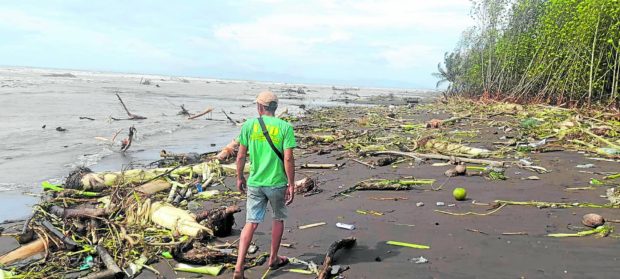Empower communities vs climate change through risk management – experts

In this photo taken on Sunday, Oct. 30, 2022, Severe Tropical Storm Paeng (international name: Nalgae) leaves in disarray the coastline of Tayabas Bay in Sariaya, Quezon. (Photo by SHERWIN ROSALES / Contributor)
MANILA, Philippines — The national government should empower communities through a risk-management approach against environmental vulnerabilities.
This is what environment and sustainability experts agreed on during a panel discussion at a conference organized recently by the Stratbase Albert del Rosario Institute.
Environment Secretary Ma. Antonia Yulo-Loyzaga advocated in the conference an integrated risk governance approach, emphasizing evidence-informed prevention and disaster risk recovery planning over emergency response — not just by the whole government but by the whole society.
“For the welfare of our people, it is incumbent upon us to prevent and mitigate factors that contribute to the people’s vulnerability to the impact of climate change,” she said.
“Lessons from past disasters need to be made part of our survival DNA,” she added.
Meanwhile, Victor Andres “Dindo” Manhit, the president of Stratbase ADR Institute, emphasized the close relationship between governance and economic development, national security, and the demands of addressing the climate crisis.
Rene “Butch” Meily, the president of the Philippine Disaster Resilience Foundation, highlighted the need to work together in times of disaster.
“The only way we are going to beat these different issues is if we work together – government, civil society, the private sector, and the public at large,” he said.
Gerard Brimo, vice chairman of the Chamber of Mines of the Philippines, pushed for sustainability measures, pointing out that the country’s current laws do not tell companies how to take care of the community and the environment.
Meily and Raymond Ravelo, chief sustainability officer of Meralco, stressed the need for more fiscal incentives for companies undertaking environmental projects. Brimo said there was a need to see stability in policies to attract large but responsible mining firms.
Manhit said that these validate the findings of a commissioned Pulse Asia survey that showed that 19% of Filipinos believe private investors can help the government manage natural resources and take care of the environment.
Guillermo “Bill” Luz, the chairperson of Livable Cities Philippines, said that building competitiveness starts in cities – not just big ones like Manila, Cebu, or Davao – because local government units are the building blocks for national resilience and development.
To do this, one has to cast a wider net to include secondary and tertiary cities through diversification of investment and job opportunities, Luz said.
“The key is preparedness, prevention, mitigation,” he said. “The storm or earthquake could be very strong, but you could survive easily. Or it could be very weak and you could be in a complete disaster if you are not prepared.”
Dr. Carlos Primo David, convenor of Philippine Business for Environmental Stewardship (PBEST), said the government could learn a few things from the private sector in allocating resources for its environmental, social, and governance efforts.
The Philippines bear the brunt of different natural disasters almost every year, such as typhoons, earthquakes, and volcanic eruptions.
In October, the Philippines’ agricultural and infrastructural damage due to Typhoon Paeng surpassed P11 billion, affecting over 5.5 million Filipinos and killing at least 160.